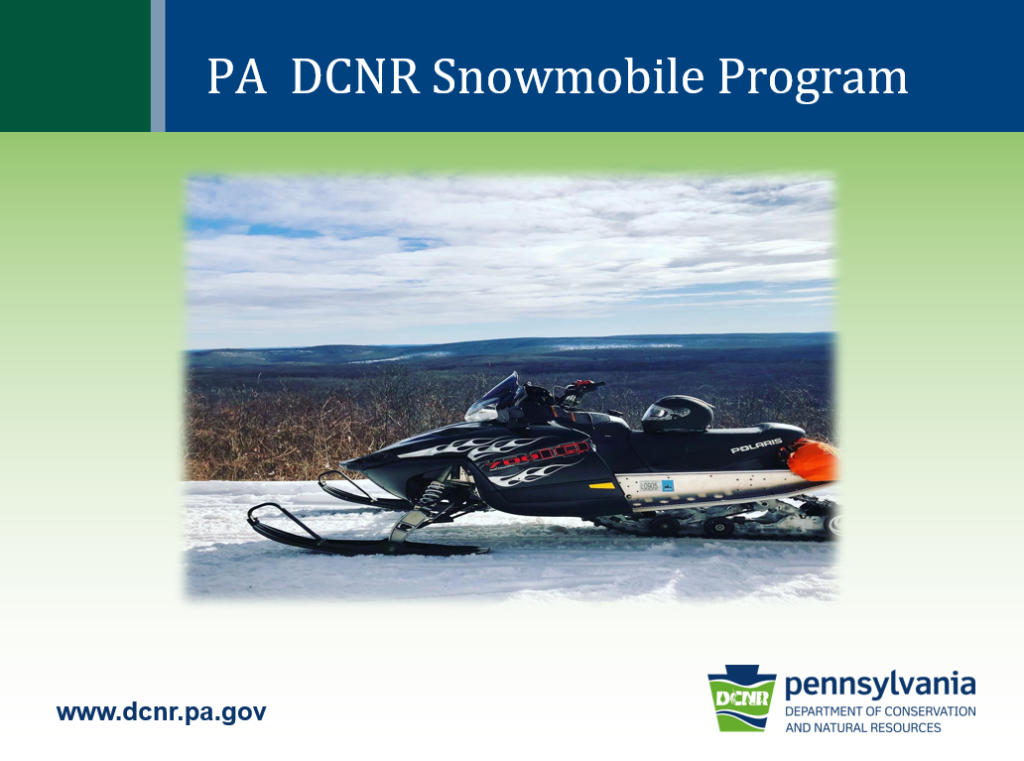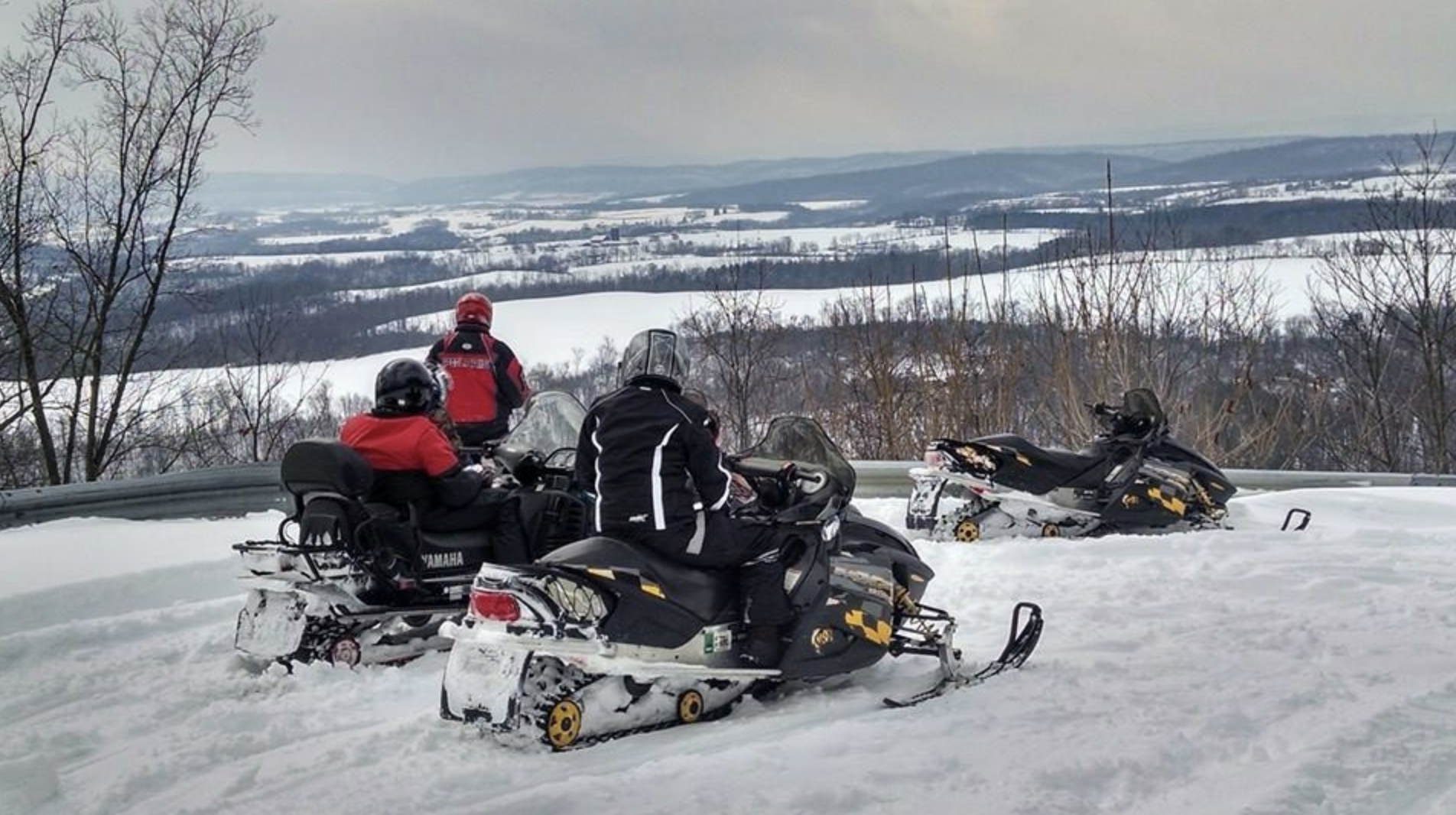PSSA hosted our 3rd Annual informational meeting with the PA Department of Conservation and Natural Resources (DCNR) on February 21. Topics included MapGears, DCNR administration, DCNR grants, registration fee and a Q&A. Below please find the presentation, video from the meeting and transcript from the Q&A.
DCNR Presentation (pdf):
DCNR Video:

Q&A
Q: Do you have any plans to link the trails in Potter, Lycoming, and Tioga to the ANF trail system?
A: The passage through to the ANF has been in some level of discussion between various groups for decades. Nearly all of the state forest roads in all three counties listed are open to the use and at least portions of each district named are thus contiguous trails. The complication has always been around how to make the connection from state forest to the ANF.
On the surface, the most promising way to accomplish this would be through the Clermont area, where the Bureau has been the beneficiary of two large acquisitions over the last couple of decades. We have been discussing ways to link the Elk State Forest through to Clermont and then beyond towards Mt. Jewett and Lantz Corners with a local club and they have made progress in working with the necessary private landowners in securing permission to cross their lands at least to the Clermont tract. We further plan for our district to work with the REIT holding timber reservation and the gas company holding the mineral rights for the Clermont tracts and conduct any necessary reviews and construction to hopefully open this in 2025.
However, there are a multitude of private landowners involved, both east and west of Clermont. The good news is at least several of these are large landowners (timber companies/REITs) which would simplifies seeking landowner permissions. The bad news is there are more landowners involved besides them and the complexity of securing a corridor increases because of this.
We’re glad to work through a tabletop analysis exercise with PSSA to sit and determine if this is a possibility and identify any limiting factors which remain for clubs to work through.
Q: Do you have any plans to link the trails in Potter, Lycoming, and Tioga to the ANF trail system?
A: The passage through to the ANF has been in some level of discussion between various groups for decades. Nearly all of the state forest roads in all three counties listed are open to the use and at least portions of each district named are thus contiguous trails. The complication has always been around how to make the connection from state forest to the ANF.
On the surface, the most promising way to accomplish this would be through the Clermont area, where the Bureau has been the beneficiary of two large acquisitions over the last couple of decades. We have been discussing ways to link the Elk State Forest through to Clermont and then beyond towards Mt. Jewett and Lantz Corners with a local club and they have made progress in working with the necessary private landowners in securing permission to cross their lands at least to the Clermont tract. We further plan for our district to work with the REIT holding timber reservation and the gas company holding the mineral rights for the Clermont tracts and conduct any necessary reviews and construction to hopefully open this in 2025.
However, there are a multitude of private landowners involved, both east and west of Clermont. The good news is at least several of these are large landowners (timber companies/REITs) which would simplifies seeking landowner permissions. The bad news is there are more landowners involved besides them and the complexity of securing a corridor increases because of this.
We’re glad to work through a tabletop analysis exercise with PSSA to sit and determine if this is a possibility and identify any limiting factors which remain for clubs to work through.
Q: Is there anything we can do to stop the online safety class to get back to in person training?
A: The Commonwealth of Pennsylvania does not currently require a “hands-on” component with the snowmobile safety class, so both virtual (online) and in-person options are available. We will continue to provide both options to ensure that training is accessible to all who are interested. Here is some attendance information from 2023:
- In-person trainings – 5 trainings for 21 students certified
- Online trainings – 101 students certified
Q: Is it possible to get some webcams at your state parks/forests to help assess current conditions on the fly?
A: DCNR will look into this further, as there are some IT and legal implications that must be considered. For example, webcams may be subject to Right-to-Know requests. We also have issues with connectivity in remote locations. If a camera is placed near district/maintenance offices, we can likely capture general conditions within an area. Actual on-trail monitoring could be more problematic due to technological limitations in certain areas. We will explore this further and will discuss this potential with PSSA leaders.
Q: PSSA was not successful in receiving a grant for the MapGears project and were told to use mini grant funds for this. Is this still a possibility?
A: PSSA has historically used the mini-grants to help snowmobile clubs pay for trail maintenance projects. Perhaps if there are leftover mini grant funds in a current PSSA mini grant, then those funds could be re-scoped to help pay for MapGears. Or, PSSA can submit a grant application for MapGears in another grant round.
Q: Please provide an explanation of the shared road situation in the Poe Valley State Park area. Why the road suddenly needs to be plowed and what is being done from an enforcement perspective to prevent the property owner from blocking snowmobile traffic and plowing the state park or forest roadway himself?
A: Most of our public use roads are opened to snowmobile use. We also have state forest regulations that prohibit plowing without the permission of the District Forester. We get many requests to plow roads through the winter.
We do allow contractors to plow roads open to conduct their business through the winter months, generally – though in some areas where the road is extremely high value as a snowmobile connector we restrict activities through the contract (timber sales) or require the lessee to provide an alternate route (OGM) if their regular business practices will disrupt the snowmobile opportunity for an extended period of time.
For most others, we deny these requests usually because of the nature of the request (ie, accessing a recreational cabin for a weekend) versus the importance of the road as a trail resource. We are occasionally approached by individuals with specific needs, usually related to emergency response, where we entertain the request. This was the case in this instance.
The winter access into the area at Poe Valley has traditionally been through the Sand Mountain Road. We have given permission to individuals to do this in the past and this continues.
The individual involved with the specific area referenced in the question is a new resident in the area who plowed the Sieglerville-Millheim Pike following the first significant snow of the New Year. Following this they discussed the situation and their circumstances with our District Forester. The District Forester was able to determine a way to preserve the integrity of the route through a combination of alternate roads along with leaving a 4-5 foot-wide lane on the section of the SM Pike which could not be bypassed. Because of this and the individuals’ circumstance of needing to maintain access for a specific emergency related need, they were granted permission to plow the SM Pike in the future to the township road going to Coburn under the conditions described above.
The trend of year-round residents building and/or buying existing real estate on inholdings along state forest roads increases annually and is not likely to reverse. We are required to approve reasonable requests for valid reasons, but we do take steps to mitigate the impact on snowmobilers and maintain connectivity. More often than not there is an alternate route or something we can do to accommodate the request.
Q: Can you add an ATV/snowmobile trail to the power lines that run east to west at Moraine State Park on the north or south side of the lake?
A: An ATV trail is not being considered at this time. Any addition of snowmobile trail would need to be collaborative with all partners, as the trail would need to be multi-use. Potential partners should contact the Park Manager at Moraine State Park for additional discussions.
Q: Are there any recent major legislative changes that should concern us as snowmobilers?
A: No.
Q: What are the necessary steps to have an existed State Forest Trail deemed “snowmobile legal”?
Interested parties should contact the local district office and discuss a proposal with the district manager or the recreation forester. They are the experts on what is possible, inclusive of the DCNR management doctrine and the nature of the trails themselves.
Also, the kind of trail being considered also matters greatly. Some designated trails (most, in fact) on state forests are not compatible with motorized use either by designation, condition of the trail surface (width, mainly) or both. These include state forest hiking trails and many of our multi-use trail system, which is geared towards non-motorized uses.
However, we do have administrative roads (usually behind gates) that either by themselves or with small extensions could make loops or extensions of trails.
If the proposed trail is determined to be feasible through the district, the next step is a state forest environmental review. This is a document we apply to many state forest management activities, including new additions or significant alteration to existing trails where the “footprint” of the trail changes. Often times on snowmobile projects the district will assist in preparing the review, though the onus is upon the party seeking the trail. The SFER is circulated Bureau-wide; if approved then the district has the permission to work with the group to install the trail.
PSSA wishes to thank everyone who attended this year’s event and looks forward to hosting this event with DCNR and the snowmobile community again next year.
Respectfully submitted,
Cindy Barrick
PSSA liaison to DCNR
PSSA Region 10 Director
DCNR Pennsylvania Trails Advisory Committee – Snowmobile Representative

